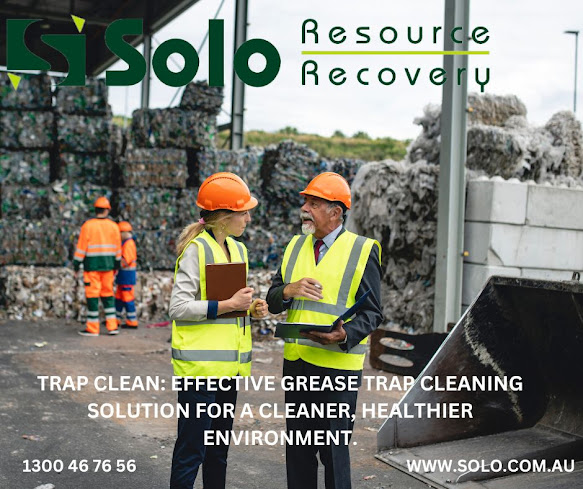Grease Trap Waste Management: Best Practices for Commercial Kitchens
In the busy world of Australian commercial kitchens, the effective management of grease trap waste is of upmost importance, and this article outlines the best practices that kitchens can apply to grease trap waste and its management, with an emphasis on the importance of maintaining hygiene standards along with operational efficiency. From understanding what grease trap waste is, to how it should be handled, and how it should be disposed of, each part of the process plays a vital role in maintaining a functional grease trap that complies with best waste management practices.
Understanding
Grease Trap Waste
Grease trap
waste, which is a blend of fats, oils, grease (FOG), and food solids, pose a
persistent challenge to commercial kitchen operations, because as these
substances accumulate within the grease trap, the risks of blockages, foul odours,
and environmental harm become imminent. Consequently, adopting best practices
in grease trap waste management is crucial for the operational sustainability
of commercial kitchens.
The Role Of
Grease Traps In Commercial Kitchens
Grease
traps serve as the first line of defence when capturing FOG and food solids,
and these traps are designed to intercept and collect these substances before
they can flow into the broader sewage system. Without an effective grease trap,
the risk of plumbing blockages and operational disruptions intensifies, which
highlights the significant role that these devices play in maintaining the
functionality of a commercial kitchen.
Challenges
Arising From Accumulated Grease Trap Waste
As grease
trap waste accumulates, several challenges emerge, posing risks to both the
immediate kitchen environment and the broader ecosystem. Blockages within the
plumbing system can lead to drainage issues, causing inconvenience during
kitchen operations, and foul odours emanating from the decomposing matter
within the traps can create an unpleasant working environment, and impact on the
dining experience of customers. Moreover, the risks extend to the potential
contamination of inside and outside water sources, which again highlights the
need for proactive grease trap waste management.
Regular
Maintenance and Professional Cleaning
At the core
of successful grease trap management is the commitment to regular maintenance
and professional cleaning. Commercial kitchens should schedule routine
inspections by a certified Grease trap cleaner
such as Solo, as we possess specialised equipment and decades of industry
experience, and we can ensure the thorough removal of accumulated waste,
preventing potential blockages and safeguarding the integrity of kitchen
plumbing infrastructure. And regular professional cleaning extends the life of
grease traps and minimises the risk of disruptions, and our methods ensure that
regulation compliance is maintained while ensuring environmentally responsible
waste disposal.
Employee
Training and Awareness Programs
The success
of any waste management initiative requires the active participation of staff,
and through the implementation of training and awareness programs employees can
understand the importance of correct waste disposal practices. Staff members
should be made aware of their role in preserving operational efficiency,
hygiene standards, and ultimately environmental sustainability, as a
well-informed workplace fosters a culture of responsibility and accountability when
undertaking waste management practices.
The
Implementation of Waste Segregation
Waste
segregation within kitchens also contributes significantly to efficient grease
trap waste management. Proper segregation ensures that grease trap waste is minimised
from the source and reduces the amount of overall waste that is generated, and by
designating separate bins for organic waste, non-recyclables, and recyclables,
kitchens not only streamline several processes but also encourage sustainable
practices.
Regulatory
Compliance and Environmental Responsibility
In
Australia, regulatory frameworks mandate the proper management of grease trap
waste in commercial kitchens, and failure to comply with these regulations can
result in penalties and legal consequences. Beyond the regulatory aspect,
adopting best practices in grease trap waste management aligns with the broader
ethos of community and environmental responsibility, and commercial kitchens,
as significant contributors to waste, have an obligation to mitigate their
impact on the environment by implementing sustainable waste management.
Best Practices
for Grease Trap Waste Management
In
conclusion, the effective management of grease trap waste in Australian
commercial kitchens necessitates a comprehensive and thoughtful approach from
owners and staff, which includes regular cleaning undertaken by a professional waste management services provider
like Solo, and each of these facets contributes to the maintenance of a functional
and successful waste management system within the workplace.
The
embracing of effective grease trap waste management ensures the longevity of
kitchen infrastructure, minimises operational disruptions, and upholds
standards of hygiene and sustainability, and by embracing best practices,
businesses not only comply with regulatory requirements, but also position
themselves as valued contributors to the community, by committing to environmental
sustainability.
To find out
how Solo can help your commercial kitchen with its grease trap maintenance,
including cleaning, collection, and disposal, please send us a message here or
give us a call on 1300 GO SOLO (1300 46 76 56).


Comments
Post a Comment